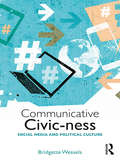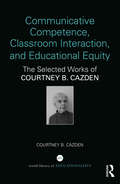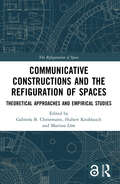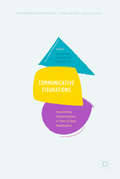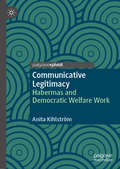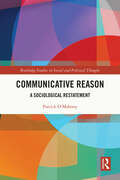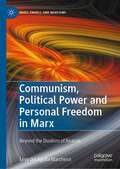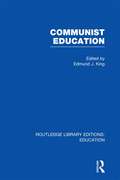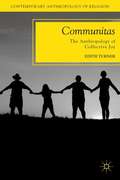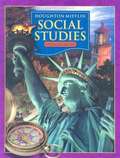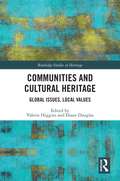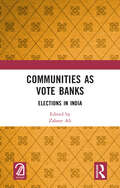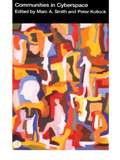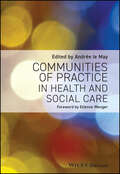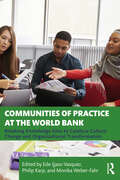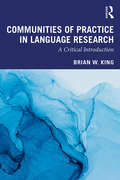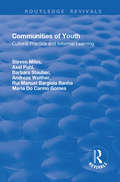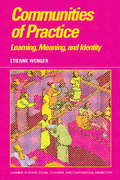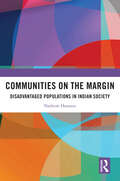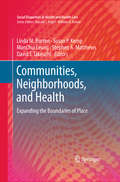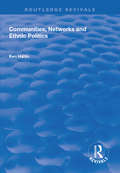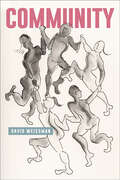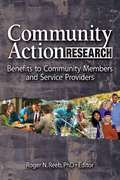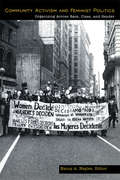- Table View
- List View
Communicative Civic-ness: Social Media and Political Culture
by Bridgette WesselsCommunicative Civic-ness explores how political culture shapes social media interactions in civic participation, arguing that social media usage is informed by context-specific civil and political culture. Drawing on cutting-edge research, the book develops a new robust theoretical and conceptual framework on civic engagement and participation, comprising: contextual ethos of civic communication; political culture and civic communication; use of social media in private and public spheres; design of social media. It critically addresses issues within the concept of political culture and develops the concept of ‘communicative civic-ness’. This concept seeks to aid a better-informed debate about the capacity of social media to support the pluralistic discussions that underpin deliberative democratic processes. This book appeals to both undergraduate and postgraduate students, as well as academics with an interest in areas including (but not limited to) sociology, political science and media studies. It will also provide useful information and understanding to third sector organisations and policy-makers regarding forms of civic participation.
Communicative Competence, Classroom Interaction, and Educational Equity: The Selected Works of Courtney B. Cazden
by Courtney B. CazdenIn the World Library of Educationalists series, international scholars themselves compile career-long collections of what they judge to be their finest pieces—extracts from books, key articles, salient research findings, major theoretical and/or practical contributions—so the world can read them in a single manageable volume. Readers thus are able to follow the themes and strands of their work and see their contribution to the development of a field, as well as the development of the field itself. Contributors to the series include: Michael Apple, James A. Banks, Joel Spring, William F. Pinar, Stephen J. Ball, Elliot Eisner, Howard Gardner, John Gilbert, Ivor F. Goodson, and Peter Jarvis. In this volume, Courtney B. Cazden, renowned educational sociolinguist, brings together a selection of her seminal work, organized around three themes: development of individual communicative competence in both oral and written language and discourse; classroom interaction in learning and teaching; and social justice/educational equity issues in wider contexts beyond the classroom. Since the 1970s, Cazden has been a key figure in the ethnography of schooling, focusing on children’s linguistic development (both oral and written) and the functions of language in formal education, primarily but not exclusively in the United States. Combining her experiences as a former primary schoolteacher with the insight and methodological rigor of a trained ethnographer and linguist, Cazden helped to establish ethnography and discourse analysis as central methodologies for analyzing classroom interaction. This capstone volume highlights her major contributions to the field.
Communicative Constructions and the Refiguration of Spaces: Theoretical Approaches and Empirical Studies (The Refiguration of Space)
by Gabriela B. ChristmannThrough a variety of empirical studies, this volume offers fresh insights into the manner in which different forms of communicative action transform urban space. With attention to the methodological questions that arise from the attempt to study such changes empirically, it offers new theoretical foundations for understanding the social construction and reconstruction of spaces through communicative action. Seeing communicative action as the basic element in the social construction of reality and conceptualizing communication not only in terms of the use of language and texts, but as involving any kind of objectification, such as technologies, bodies and non-verbal signs, it considers the roles of both direct and mediatized (or digitized) communication. An examination of the conceptualization of the communicative (re-)construction of spaces and the means by which this change might be empirically investigated, this book demonstrates the fruitfulness of the notion of refiguration as a means by which to understand the transformation of contemporary societies. As such, it will appeal to sociologists, social theorists, and geographers with interests in social construction and urban space.
Communicative Figurations: Transforming Communications in Times of Deep Mediatization (Transforming Communications – Studies in Cross-Media Research)
by Andreas Hepp Andreas Breiter Uwe HasebrinkThis book is open access under a CC BY 4. 0 license. This volume is about how to research the influence of our changing media environment. Today, there is not one single medium that is the driving force of change. With the spreading of various technical communication media such as mobile phone and internet platforms, we are confronted with a media manifold of deep mediatization. But how can we investigate its transformative capability? This book answers this question by taking a non-media-centric perspective, researching the various figurations of collectivities and organizations humans are involved in. The first part of the book outlines a fundamental understanding of the changing media environment of deep mediatization and its transformative capacity. The second part focuses on collectivities and movements: communities in the city, critical social movements, maker, online gaming groups and networked groups of young people. The third part moves institutions and organizations into the foreground, discussing the transformation of journalism, religion, politics, and education, whilst the fourth and final part is dedicated to methodologies and perspectives.
Communicative Legitimacy: Habermas and Democratic Welfare Work
by Anita KihlströmThis book analyses the legitimacy deficits in democratic welfare work using Habermas’ theories of communicative action, law and morality. Based on their underlying intersubjective perspectives, legitimacy problems can be identified and corrected, e.g. lack of confidence, dignity, respect, broken expectations, ignorance or mistrust of its administration. In modern societies with their many different contexts, a mutual understanding of facts, norms and expressions has become even more important in order to act constructively in daily life. These needs have increased the tension between the individual and the system, which becomes especially evident when globalised and individualised service users ask for welfare services. Therefore, professionals must develop an ability to understand how these legitimacy problems arise and how they can be dealt with democratically. This book responds to these needs, and will be of interest to students, scholars and practitioners working across democratic welfare, social policy, social work, and sociology.
Communicative Reason: A Sociological Restatement (Routledge Studies in Social and Political Thought)
by Patrick O'MahonyThe book examines philosophical and sociological approaches within critical theory and more widely from the vantage point of communicative reason. It seeks to revitalize the sociological dimension of critical theory by advancing a critical sociology of reason. It does so fully in the knowledge that reason is a contentious concept in sociology and other disciplines. Nonetheless, building on Habermas’s original insight, it argues that an extensively modified version of communicative reason is indispensable. This modified approach will draw extensively from Peirce’s pragmatist semiotics and critical cognitive sociology. Such a focus has significant implications for meta-theoretical, theoretical-empirical, and methodological approaches in critical theory, critical sociology, and related disciplines. This book will be of interest to readers in the social sciences, humanities, and philosophy who value the importance of a social theory of a reasonable society for their disciplines and for increasingly essential interdisciplinary activities. The book will also appeal to many in critical theory and beyond who are interested in the cognitive foundations of normative orders, including unjust or pathological as well as actually or potentially just foundations. The book emphasizes both validity and critique within communicative reason and critical theory and accordingly presents a distinctive perspective on critical-reconstructive research.
Communism, Political Power and Personal Freedom in Marx: Beyond the Dualism of Realms (Marx, Engels, and Marxisms)
by Levy del Aguila MarchenaThis book investigates communism in Marx’s writings, incorporating a consideration of communist politicity. The author outlines the arguments by which it is possible to sustain—from Marx—the idea that human emancipation against capital also means the elimination of the State, the public, and the political dimension of praxis. He also posits that the concrete tasks of the “management of the common” in a communist society require political mediations that allow us to confront the difference inherent to the personality of freely associated producers, as well as the ontological finitude from which no technical power can evade. Finally, assuming Marx as a starting point whose work remains an inescapable source for “thinking communism,” the book proposes a research agenda from Marx and beyond to continue in this imperative task.Levy del Aguila Marchena is Senior Professor and Chair of the Department of Management Sciences at the Pontificia Universidad Católica del Perú. He has published extensively on Marx, political philosophy, and applied ethics.
Communist Education (Routledge Library Editions: Education)
by Len Barton Martin LawnDevelopments and trends in Communist education are traced in this authoritative survey by specialists. Eight chapters deal with particular aspects: ideology, psychology, the selective process, the roles of teachers and parents, polytechnical education, the universities and professional institutes. Three chapters survey the former East Germany, Poland and China as special case-studies. A concluding chapter examines common ground between Communist and other systems.
Communitas
by Edith TurnerCommunitas is inspired fellowship; a group's pleasure in sharing common experiences; being 'in the zone' - as in music, sport, and work; the sense felt by a group when their life together takes on full meaning. The experience of communitas, almost beyond strict definition and with almost endless variations, often appears unexpectedly.
Communities
by Herman J. Viola Sarah Witham Bednarz Mark C. Schug Charles S. White Maryellen Vogt Cheryl Jennings Dolores Beltra Carlos E. CortésNIMAC-sourced textbook
Communities
by Herman J. Viola Sarah Witham Bednarz Mark C. Schug Charles S. White Maryellen Vogt Cheryl Jennings Dolores Beltra Carlos E. CortésNIMAC-sourced textbook
Communities and Cultural Heritage: Global Issues, Local Values
by Valerie HigginsCommunities and Cultural Heritage explores the relationship between communities, their cultural heritage and the global forces that control most of the world’s wealth and resources in today’s world. Bringing together scholars and heritage practitioners from nine countries, this book contributes to the ongoing dialogue on community heritage by analysing impediments to full community participation. The underminin of local communities comes at a high price. As the chapters in this book demonstrate, the knowledge embedded within traditional and Indigenous heritage creates communities that are more resilient to environmental and social stressors and more responsive to contemporary challenges such as climate change, environmental degradation, post-disaster recovery and relocation. Cultural heritage practices often fail to capitalise upon local knowledge and traditional skills and undervalue the potential contribution of local communities in finding creative and resourceful solutions to the issues they are confronting. Arguing that the creation of successful community heritage project requires ongoing reflection on the aims, methods, financing and acceptable outcomes of projects, the volume also demonstrates that the decolonization of Western-focussed heritage practices is an ongoing process, by which subaltern groups are brought forward and given a space in the heritage narrative. Reflecting on trends that impact communities and heritage sites across different geographical regions, Communities and Cultural Heritage will be of interest to academics, students and practitioners of cultural heritage,archaeology and anthropology around the world.
Communities as Vote Banks: Elections in India
by Zaheer AliIndian plurality is unique in the world. No other country can boast of having so many races, religions, castes, cultures, languages and regional diversities within its boundaries as India can. This plurality, while providing a very chequered and rich socio-cultural scenario, also impinges a few tensions that often lead to violent clashes. Since India is also the largest democracy in the world, its diversified society also influences the electoral scenario.This book compiles research papers by social scientists to analyze the electoral behavior of communities constituted on the basis of religion, caste and region. It also presents a critique of the role of media during elections, emphasizes the need to use latest technological devices to increase the involvement of the electorates, and proposes necessary and practical reforms in the process of elections to ensure better representation.Print edition not for sale in South Asia (India, Sri Lanka, Nepal, Bangladesh, Pakistan or Bhutan)
Communities in Cyberspace
by Marc Smith Peter KollockThis wide-ranging introductory text looks at the virtual community of cyberspace and analyses its relationship to real communities lived out in today's societies. Issues such as race, gender, power, economics and ethics in cyberspace are grouped under four main sections and discussed by leading experts: * identity* social order and control* community structure and dynamics* collective action. This topical new book displays how the idea of community is being challenged and rewritten by the increasing power and range of cyberspace. As new societies and relationships are formed in this virtual landscape, we now have to consider the potential consequences this may have on our own community and societies. Clearly and concisely written with a wide range of international examples, this edited volume is an essential introduction to the sociology of the internet. It will appeal to students and professionals, and to those concerned about the changing relationships between information technology and a society which is fast becoming divided between those on-line and those not.
Communities of Practice at the World Bank: Breaking Knowledge Silos to Catalyze Culture Change and Organizational Transformation
by Ede Ijjasz-Vasquez Philip Karp Monika Weber-FahrIllustrated by the experience of the World Bank, this book explains how knowledge management, traditionally viewed as being about information systems and processes, can play a fundamental corporate role by creating a competitive edge for organizations, increasing team performance, and fostering effective, large-scale organizational change. Rich and powerful stories, told by economic development practitioners and knowledge management specialists throughout the World Bank, describe the strategies, instruments, tools, and processes at the core of one of the most important and radical reorganizations of the world’s premier international development institution. Going far beyond other knowledge management titles, this book: shows how knowledge management can be a source of competitive advantage and team performance, rather than a back-room support function focuses on the role of the "software" of knowledge management, most notably the use of communities, culture, and collaboration across internal silos to create value; and demonstrates the role that knowledge management can play in fostering innovation, and development of new business lines and strategies by global teams in diverse locations Written not only for knowledge management professionals, but also for C-suite executives and middle managers who will see the benefits of bringing knowledge management to the core of organizational performance and competitive advantage, the book provides practical examples that can be replicated in other large global knowledge, financing, and development institutions and that will be relevant for public, private, and non-profit organizations.
Communities of Practice in Language Research: A Critical Introduction
by Brian W. KingCommunities of Practice in Language Research provides an up-to-date and critical introduction to the community of practice framework and how this can be applied to language research. Critiquing and offering alternative suggestions for the ways in which researchers frame research participants as members of communities of practice, with the goal of inspiring use of the Community of Practice (CofP) model in new areas of research, this book: engages in extended critical analysis of past research as well as questioning recent applications and suggesting limitations incorporates instructive examples from multiple fields, including Sociolinguistics, Linguistic Anthropology, Critical Discourse Studies, Language Teaching & Learning, Literacy Studies, and a trailblazing section on Language & Digital Media brings up-to-date the key questions and concerns around the Communities of Practice model, debunking myths and re-emphasising ongoing challenges. Communities of Practice in Language Research is essential reading for undergraduate and postgraduate students studying research methods or undertaking research projects in those areas.
Communities of Youth: Cultural Practice and Informal Learning (Routledge Revivals)
by Steven Miles Barbara Stauber Andreas Walther Axel Pohl Rui Manuel Banha Maria do GomesThis title was first published in 2002.Communities of Youth critically evaluates what it means to be a young person at the beginning of the twenty-first century and the problems, opportunities and dilemmas that emerge from the experience. The book is concerned with putting key conceptual debates to do with youth in a comparative cutting-edge empirical context. In particular, it endeavours to transcend what its contributors feel is one of the most damaging trends of recent work on the question of youth, namely: the division between young people’s transitions and youth culture. Building upon the notion of lifestyle as a means of bridging this gap, the book provides something original and timely: a way of linking young people’s broader structural concerns with the cultural and community contexts within which they conduct their everyday lives. The data discussed in the book emanates from a comparative European Union project conducted in Great Britain, Germany and Portugal. The three training programmes examined are based on the performing arts, but the authors argue that the skills young people glean from these courses are more to do with generic skills such as the ability to work effectively in groups, mutual responsibility, discipline and above all, confidence, than the technical proficiencies of performance. These courses become an important part of the young people’s lives and as such, provide a space within which they become themselves . In this sense, the book highlights the fact that far from being passive recipients of public policy, young people actively engage with the power structures that combine to shape their lives. Communities of Youth therefore considers the diversity of European youth and by tapping into this diversity it develops important recommendations that will inform academic debate, research and youth policy.
Communities of practice: Learning, Meaning, And Identity (Learning In Doing Ser.)
by Etienne WengerLearning is becoming an urgent topic. Nations worry about the learning of their citizens, companies about the learning of their workers, schools about the learning of their students. But it is not always easy to think about how to foster learning in innovative ways. This book presents a framework for doing that, with a social theory of learning that is ground-breaking yet accessible, with profound implications not only for research, but also for all those who have to foster learning as part of their responsibilites at work, at home, at school.
Communities on the Margin: Disadvantaged Populations in Indian Society
by Saiyed Nadeemul HasnainThis book probes into the marginalized communities of the Indian society through historical and contemporary societal perspectives. It discusses socio-cultural aspects of the experiences of Scheduled Castes, Dalits, Scheduled Tribes/tribal communities, Other Backward Classes, linguistic minorities, religious minorities and the queer/LGBT as sexual minorities.Adopting an inter-disciplinary approach, it looks at all these segments of Indian society through historical and societal perspectives. Divided into three broad sections – Scheduled Castes, Scheduled Tribes, and minorities, this book provides historical perspective backed by the contemporary situation and emerging social changes among these communities. Written in a lucid manner, the book aims to reach and impact readers without having any prior academic exposure to this subject area.This book would be useful to the students, researchers and teachers of sociology, social work, history, economics, political science, and other interdisciplinary courses in social sciences. The book will also be valuable reading for those interested in South Asian studies, especially contemporary Indian society.
Communities, Neighborhoods, and Health: Expanding the Boundaries of Place (Social Disparities in Health and Health Care #1)
by Stephen A. Matthews Linda M. Burton David T. Takeuchi Manchui Leung Susan P. KempPlace is an important element in understanding health and health care disparities. More that merely a geographic location, place is a socio-ecological force with detectable effects on social life, independent well-being, and health. Despite the general enthusiasm for the study of place and the potential it could have for a better understanding of the distribution of health in different communities, research is at a difficult crossroads because of disagreements in how the construct should be conceptualized and measured. This edited volume incorporates an cross-disciplinary approach to the study of place, in order to come up with a comprehensive and useful definition of place. Topics covered include: Social Inequalities, Historical Definitions of Place, Biology and Place, Rural vs. Urban Places, Racialization of a Place, Migration, Sacred Places, Technological Innovations An understanding of place is essential for health care professionals, as interventions often do not have the same effects in the clinic as they do in varied, naturalistic social settings.
Communities, Networks and Ethnic Politics (Routledge Revivals)
by Ken HahloFirst Published in 1998, this study explores ethnic community political participation in local politics in the North West British town. The analysis is located within the framework of the shift from Fordism to post-Fordism.From 1965 to 1980 ethnic communities increased their access to scarce resources including political influence by engaging in ethnic politics. Using membership of religious organisations as structures of support, elected men deployed ethnic identities to compete with others for ethnic support and influence over local decision-making processes. This gave ethnic minorities a positive role in local politics. With the support of local community relations councils (CRCs), ethnic politics flourished. It gave ethnic communities real opportunities to participate as ethnic communities in politics. Using local events, ethnic leaders competed for political influence and ethnic support. After 1977 the shift from Fordism to post-Fordism brought about a decline in ethnic political participation. While conferment of citizenship secured their right to stay in Britain, the rise in consumerism undermined the manufacturing sector on which they depended for work. With no ethnic political identity, today, these communities are again politically disadvantaged.
Community
by David WeissmanCommunities are vital to personal and social well-being because collaboration is required where skills and resources are scarce; their pathologies—anonymity and isolation, tribalism and murder—defeat us.Community is often invoked respectfully but without a clear referent. The word is said to be used ninety-four ways, evidence that its sense is diffuse. Community clarifies the word's principal expressions and the alternative ideological spaces-holistic and hierarchical or open and tolerant-in which communities form. Members bind in the interest of utility-jobs or schools-or because home and friendship are the focus of feeling and significance. These binders are social glue: they explain our dedication to communal aims and loyalty to fellow members. Autonomy in their context is socialized; its bases are the information, attitudes, and skills acquired when families and schools prepare us for roles in communities inherited or chosen. Yet community is fraught. Holistic societies are repressive; open societies are vulnerable. The members of successful communities-families, businesses, and schools-often thrive. Those excluded for want of luck or skill are abandoned and anonymous. Their isolation is one of an open society's two pathologies: collaboration is a social necessity when resources, space, and skills are scarce; competition turned visceral and murderous is a vice.
Community Action Research: Benefits to Community Members and Service Providers
by Roger N. ReebDiscover how to better help those in your community in need of servicesCommunity Action Research comprehensively explores models for community action research, incorporating quantitative and qualitative research to highlight the advantages to community members as well as the volunteers/paraprofessionals who implement the services. Respected experts present the latest research on the fulfillment of the needs of community members as well as the benefits to the volunteers and paraprofessionals, including psychological empowerment, psychological sense of community, and other facets of personal development.Community Action Research is helpfully organized into two sections. The first section presents a sample of empirical studies that examines whether community action research demonstrated benefits for community members. The second section provides empirical studies that show the positive impact of community action research on the personal development of volunteers and paraprofessionals who provided the research-related services. This detailed text is carefully referenced and uses several tables to enhance understanding of research data. Community Action Research discusses: the Adolescent Diversion Project as an alternative to juvenile court home-based behavior modification programs for autistic children the People Awakening Project and the role paraprofessionals played in Alaska Native sobriety a crime prevention project launched by a residential neighborhood association the Actual Community Empowerment Reading Program which utilized community members as literacy tutors the Community Service Self-Efficacy Scale&’s reliability and validity the Hawaiian Studies Program&’s weekly participation in community service-learning exercises and more!Community Action Research is insightful reading for psychologists, sociologists, social workers, criminal justice researchers and professionals, community counselors, practitioners and researchers in community prevention and intervention, clinical supervisors, service learning specialists, educators, students, and mental health and human services program administrators, planners, or evaluators.
Community Activism and Feminist Politics: Organizing Across Race, Class, and Gender (Perspectives on Gender)
by Nancy NaplesThis collection demonstrates the diversity of women's struggles against problems such as racism, violence, homophobia, focusing on the complex ways that gender, culture, race-ethnicity and class shape women's political consciousness in the US.
